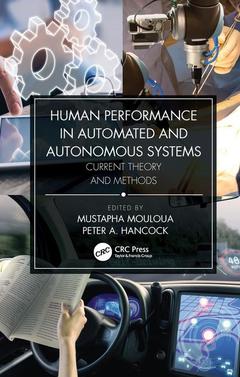Human Performance in Automated and Autonomous Systems Current Theory and Methods
Coordonnateurs : Mouloua Mustapha, Hancock Peter A.

This book examines recent advances in theories, models, and methods relevant to automated and autonomous systems. The following chapters provide perspectives on modern autonomous systems, such as self-driving cars and unmanned aerial systems, directly from the professionals working with and studying them. Current theories surrounding topics such as vigilance, trust, and fatigue are examined throughout as predictors of human performance in the operation of automated systems.
The challenges related to attention and effort in autonomous vehicles described within give credence to still-developing methods of training and selecting operators of such unmanned systems. The book further recognizes the need for human-centered approaches to design; a carefully crafted automated technology that places the "human user" in the center of that design process.
Features
- Combines scientific theories with real-world applications where automated technologies are implemented
- Disseminates new understanding as to how automation is now transitioning to autonomy
- Highlights the role of individual and team characteristics in the piloting of unmanned systems and how models of human performance are applied in system design
- Discusses methods for selecting and training individuals to succeed in an age of increasingly complex human-machine systems
- Provides explicit benchmark comparisons of progress across the last few decades, and identifies future prognostications and the constraints that impinge upon these lines of progress
Human Performance in Automated and Autonomous Systems: Current Theory and Methods illustrates the modern scientific theories and methods to be applied in real-world automated technologies.
Chapter 1 Designing Wearable Interfaces for People Who Have Hard Jobs. Chapter 2 Humans and Automated Decision Aids: A Match Made in Heaven? Chapter 3 The Quest for Alternatives to “Levels of Automation” and “Task Allocation”. Chapter 4 Why Representations Matter: Designing to Support Productive Thinking. Chapter 5 Vigilance and Workload in Automated Systems:Patterns of Association, Dissociation, and Insensitivity. Chapter 6 Theoretical Perspectives on Adaptive Automation. Chapter 7 Fatigue, Automation, and Autonomy: Challenges for Operator Attention, Effort, and Trust. Chapter 8 Human-Automation Interaction and the Challenge of Maintaining Situation Awareness in Future Autonomous Vehicles. Chapter 9 Human Factors Issues Regarding Automation Trust in UAS Operation, Selection, and Training. Chapter 10 Autonomous Systems Theory and Design and a Paradox of Automation for Safety. Chapter 11 Workload and Attention Management in Automated Vehicles. Chapter 12 Attention Management in Highly Autonomous Driving. Chapter 13 To Autonomy and Beyond. Chapter 14 Teleology for Technology. Chapter 15 The Axial Age of Artificial Autonomy.
Dr. Mouloua is Professor of Psychology at the University of Central Florida, Orlando, Florida and was the Director (2009 –2017) and Associate Director (2006-2009) of the Applied/Experimental and Human Factors Psychology Doctoral Program, Director and Chief Scientist (2001-2014), Associate Director and Senior Research Scientist (1998-2001) of the Center for Applied Human Factors in Aviation, and Associate Director Human Factors Research at the Center for Advanced Transportation Systems Simulation (2001-2003). Dr. Mouloua has over 30 years of experience in the field of Human Factors and Ergonomics. His research interests include human-automation interaction, attention and workload, assessment of older drivers and pilots, UAS operation, selection, training, and simulation technologies across a variety of transportation systems. Dr. Mouloua is the editor or co-editor of several books including Human Performance in Automated Systems: Current Research and Trends (1994, Erlbaum Press), Human-Automation Interaction: Research and Practice (1997, Erlbaum Press), Automation and Human Performance: Theory and Applications (1996, Erlbaum Press), Automation Technology and Human Performance: Current Research and Trends (1999, Erlbaum), Human Factors in Simulation and Training (2009, Taylor & Francis Group), Automation and human performance: Theory, research, and practice (2004, Volumes I & II; Lawrence Erlbaum Associates), and Proceedings of the 2nd ACM Symposium on Computer Human Interaction for Management of Information Technology (ACM, CHIMIT, 2008). Dr. Mouloua published over 190 papers and scientific reports and made over 300 presentations at various national and international meetings. Dr. Mouloua was the recipient of the prestigious Jerome Ely (1997) and the Tidewater (1999) Awards from the Human Factors and Ergonomics Society. At UCF, Dr. Mouloua received eight prestigious Teaching and Research Aw
Date de parution : 10-2019
15.6x23.4 cm
Thèmes de Human Performance in Automated and Autonomous Systems :
Mots-clés :
Insufficient Cognitive Effort; Team Performance; SAE International; Human Factors; HAI; Situation Awareness; Performance Insensitivity; Virtual Environments; Adaptive Automation; Augmented Reality; Vice Versa; Human-Centered Design; Federal Aviation Administration; human-robot interaction; FAA; systems theory; Human Automation Interaction; High LOA; automated system; Vigilance Decrement; automation; autonomy; Human Machine Systems; control; Automated Decision Aids; control system; Driving Task; display; Vigilance Tasks; health; Vehicle Automation; human performance; Autonomous Vehicles; Automation Bias; implementation; Passive Fatigue; organizations; Sensemaking System; robot; PA Program; Back End Support; Multiple Unmanned Vehicles; virtual environment; Driver Workload; workload; autonomous system; ergonomics



